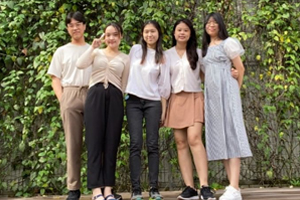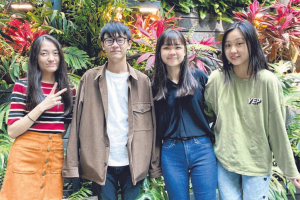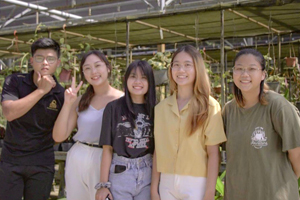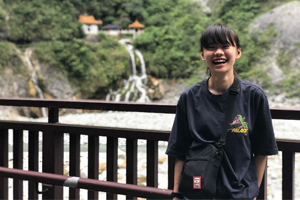Why CMC?
- The only bilingual media course that prepares you to be a next-gen content producer for a globalised world as well as regional Chinese-speaking markets
- Broad-based curriculum equips you with digital media skills for a wide range of platforms, widening career options
- Collaborate with leading industry partners such as Our Grandfather Story, Mediacorp and SPH Media for real-world learning
- One-year or six-month internship, project work or elective modules – Choose your learning journey in your final year!
About CMC
Ever dreamt of entering the booming Chinese media industry in the region? With a myriad of social media platforms available, there is a growing demand for content creators and professionals.
If bilingualism is your forte, put your skills to good use with the Diploma in Chinese Media & Communication (CMC). You will be trained to become a versatile media professional capable of producing engaging content for a wide range of digital media platforms.
Learn storytelling and presentation skills in both Chinese and English, as well as the fundamentals
of the Chinese media business. Besides honing your skills in traditional media platforms, you will learn data analytics, digital marketing and user experience & interface (UX/UI) design to prepare you for today’s dynamic media landscape. Get set to captivate the regional audience with compelling content via new media channels like Instagram, TikTok and Red (Xiaohongshu)!
Be career-ready for the media landscape with opportunities to collaborate with your peers and industry partners on real-world projects! Our hands-on training hones your skills and develops your confidence so you can thrive in the creative industries.
Our close ties with leading industry partners will give you insights into how organisations create impactful brand stories. In your final year, choose a one-year internship to deepen real-world experience at top local media companies such as SPH Media, Mediacorp, Wawa Pictures, August Pictures and Our Grandfather Story. Or you can opt for a combination of a six-month internship and project work or elective modules to expand your skill sets.




Overview of Your CMC Journey
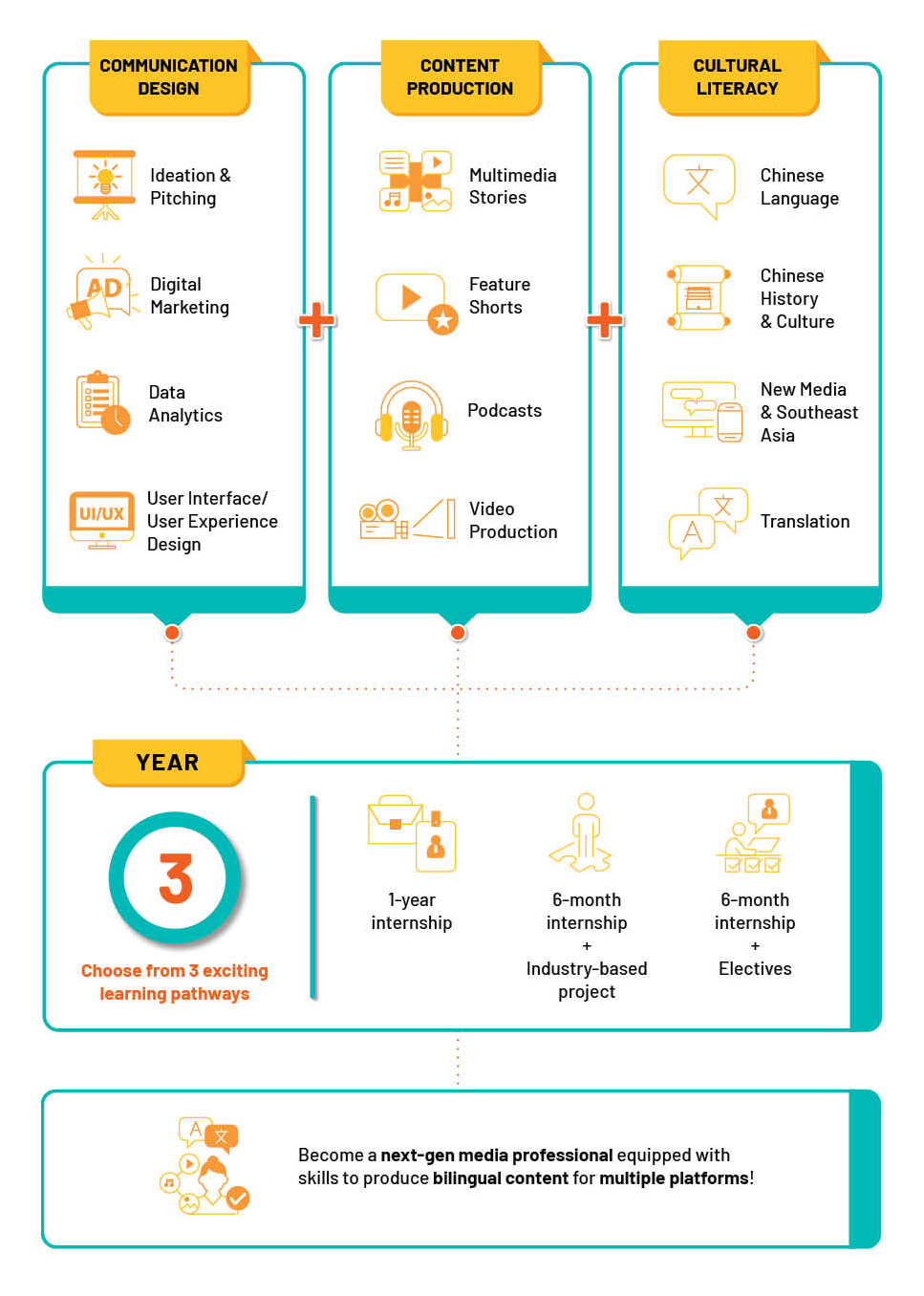
Inspiring Portfolio
Further Studies
The broad-based curriculum in CMC offers graduates a wide range of further studies options. Some of the local and overseas universities that our graduates have enrolled in include:
Singapore
- Nanyang Technological University
- National University of Singapore
- Singapore Management University
- Singapore University of Social Sciences
- Lasalle College of the Arts
Australia
- Queensland University of Technology
- University of Melbourne
- University of New South Wales
- University of Queensland
China
- Beijing Film Academy
- Communication University of China
- Fudan University
Hong Kong
- City University of Hong Kong
- Hong Kong Baptist University
Taiwan
- National Chengchi University
- Shih Hsin University
Careers
As a CMC graduate, you are a bilingual media practitioner who is ahead of the crowd. You can look forward to job roles such as:
- Assistant Producer
- Content Producer
- Junior Designer
- Marketing Communications Executive
- Radio Presenter
- Radio Producer
- Reporter
- Video Editor
- Video Journalist
- TV Producer
Entry Requirements
AGGREGATE TYPE ELR2B2-A
To be eligible for consideration, candidates must have the following GCE ‘O’ Level examination (or equivalent) results.
| Subject | 'O' Level Grade |
|---|---|
| English Language | 1-6 |
Higher Chinese or | 1-4 1-3 |
| Any one of the 1st group of Relevant Subjects for the ELR2B2-A Aggregate Type | 1-6 |
Applicants must also have sat for Additional Mathematics / Mathematics and fulfil the aggregate computation requirements for the ELR2B2-A Aggregate Type ( English Language, 2 relevant subjects and 2 other best subjects) listed at www.np.edu.sg/docs/ELR2B2.pdf.
For students with other qualifications, please refer to the NP website for the entry requirements and admissions exercise period.
What You Will Learn
Academic Communication & Thinking (4 Credit Units)
This module aims to develop students' critical thinking, writing and presentation skills in various academic and professional contexts. Students will also learn how to conduct basic research and accurately cite sources in this module.
Speech Communication in Chinese (4 Credit Units)
This module teaches students the basics of Chinese phonetics as well as speech communication styles in different social settings. It trains students to be effective, articulate, confident, composed and credible Mandarin speakers in a variety of professional situations. The module also explores how communication affects human behaviour and social development.
Media Writing in Chinese (4 Credit Units)
This module aims to introduce the basic skills and general principles of media writing. Students will learn to write for multiple media platforms, from short news blurbs to copy for social media.
Storytelling with Visuals (4 Credit Units)
In this module, students will explore the art of visual storytelling through photography. They will learn how to operate digital cameras with different settings to create various contexts and will be introduced to the principles of shot sizes and photography techniques. Additionally, students will learn how to use basic imaging software to enhance and deliver high-quality pictures. By the end of the module, students will have a comprehensive understanding of how to use photography as a means of visual storytelling and will be equipped with the skills to create visual narratives through their photographs.
Publication Design & Production (4 Credit Units)
This module introduces students to typography and page composition, including grid layout, and the principles of alignment, contrast, proximity and repetition. Through lectures, hands-on projects and classroom critiques, students learn the process of designing magazines, brochures, periodicals, books and collateral pieces. This module also covers writing design specifications, copy-fitting, copy-editing and newspaper production layout.
Health & Wellness^ (1 Credit Unit)
This is a Level 1 Core module for all Year 1 students. The module will introduce students to the importance of maintaining both physical and mental health through the knowledge and monitoring of health indicators, and application through appropriate exercises. The aim of the module is to empower students with basic knowledge and skills to be independent and responsible in maintaining overall personal health.
^ Interdisciplinary Studies (IS) modules account for 10 credit units of the diploma curriculum. They include modules in communication, innovation and world issues, as well as an interdisciplinary project. By bringing students from diverse diplomas together, the interdisciplinary project fosters collaboration to explore and propose solutions for real-world problems. IS aims to develop students to be agile and self-directed learners, ready for the future workplace.
This module aims to provide students with an understanding of effective communication practices in the workplace. Students will develop the necessary skills to communicate effectively with stakeholders, colleagues, and clients in various communication contexts.
Audience Research (4 Credit Units)
This module introduces different types of mass media research methodologies, with a focus on survey research and focus group study. Students will learn how to conduct the two types of studies to understand the needs of the audience. They will also learn how to analyse the data and present the findings in both oral and written formats. The module is conducted in English.
Fundamentals of Translation (3 Credit Units)
This module introduces students to fundamental strategies and techniques of English-Chinese (EC) and Chinese- English (CE) translation. Students will learn the basic principles of written translation and apply these principles to the translation of a variety of text genres. Students will also understand and experience how a translator makes decisions in actual translation practices by considering a host of factors, including the author’s intention, the desired function of the translated text as well as the needs of target language readers.
Radio and Vodcast Production in Chinese (4 Credit Units)
This module is designed to provide students with the necessary skills to produce professional-quality radio and vodcast content. Through a combination of theoretical and practical training, students will learn how to research, script, and produce engaging radio programmes and vodcasts. They will also develop on-air presentation skills and gain an understanding of the radio industry and the job of a radio presenter.
UI & UX Design (4 Credit Units)
This module introduces the process of user interface (UI) design, digital content development and new media skills. Students will also gain understanding in the usability and usefulness of a digital product in the area of user experience (UX). The module is conducted in Chinese.
Innovation Made Possible (3 Credit Units)
Underpinned by the Design Thinking framework, Innovation Made Possible aims to build creative confidence in you. The module will sensitize you to the process of user-centric problem solving and allow you to discover and hone your innate ability to think creatively, come up with innovations to tackle problems and explore new ideas for your studies and beyond.
This module is designed to equip students with the skills and knowledge required to successfully navigate the transition from education to the workplace. Topics covered in this module will include job search strategies, resume and cover letter writing, interview skills, professional networking and personal branding.
Digital Journalism in Chinese (4 Credit Units)
This module equips the students with the basic skills in interviewing, writing news stories, and producing short video clips for digital news platforms. Students will learn to gather information from different sources and to critically assess the information they obtain. They will also examine the social responsibility and ethical framework of journalists, and learn to write with accuracy, clarity and credibility.
Video Production (4 Credit Units)
This module provides a theoretical and practical introduction to video production techniques, including single and multi-camera operation, lighting, sound recording, and basic video editing. Students will work on hands-on projects to apply the skills learned in class and will gain the ability to produce high-quality video content suitable for broadcast or online platforms.
Integrated Marketing Communication (4 Credit Units)
This module equips students with the necessary strategic skills, as well as tools and techniques to organise and implement marketing and publicity activities. Students will learn to pitch stories to the media, and plan publicity campaigns or events. The module is conducted in Chinese.
New Media in Southeast Asia (4 Credit Units)
This module explores the impact of new media technologies on contemporary Southeast Asian societies. Students will learn about new media, including social media and digital platforms in the context of Southeast Asian societies. The module will cover the role of new media in shaping social norms and behaviours in Southeast Asian, as well as the ethical and regulatory challenges related to new media in different ASEAN societal contexts. By the end of the module, students will have a foundational understanding of new media and their impact on media studies in an Southeast Asian context.
This module examines the legal, regulatory and ethical issues that media practitioners face in the course of their work, with emphasis placed on Singapore. Students will learn the fundamental concepts and doctrines in law and explore the different theoretical approaches to media ethics. Using real-life and hypothetical case studies, they will develop analytical skills to make ethical judgments in complex situations. Areas of interest include contracts, censorship, defamation and intellectual property. The module is conducted in English.
Chinese History & Literature (4 Credit Units)
The objective of this module is to broaden students' cultural perspectives, cultivate their appreciation of Chinese history and culture, and provide them with a deeper understanding of Chinese traditional values through exposure to literature and media works. Students will develop an appreciation for classical literary works and a more nuanced understanding of how Chinese traditional values have shaped modern Singaporean society.
Feature Production (4 Credit Units)
This module equips students with practical skills to produce video news stories, feature stories and mini documentaries. Students will learn about the video production process, from research and filming to funding and distribution. The module is conducted in Chinese.
Digital Marketing & Advertising (4 Credit Units)
This module provides an overview of digital marketing and advertising channels and how they can be integrated. Students will learn key tactics like social media marketing, content marketing, SEO, and PPC advertising. They will also learn how to use analytics to measure and optimize their campaigns. By the end of the module, students will have developed comprehensive digital marketing and advertising plans that are tailored to meet specific client needs. The module is conducted in Chinese.
World Issues: Singapore's Perspective^ (2 Credit Units)
This module will expose you to a wide range of global issues discussed in the context of Singapore as a nation state. You will be guided to critically examine current affairs from various perspectives and develop an appreciation of the dynamism behind current world problems and consider possible solutions. The intent of this module is to develop thinking students with well-considered perspectives who are able to articulate reasonable opinions, make thoughtful decisions and informed choices as active citizens in society. You will also be exposed to a multidisciplinary approach in the mitigation of global challenges and thus be adequately prepared to handle Year 3 IS interdisciplinary Project ID.
6-Month Internship (20 Credit Units)
This module provides the opportunity for students to be assigned to industry attachments at reputable organisations. The attachment, which will be for the entire internship semester, will match students’ abilities and interests to relevant organisations.
Project ID: Connecting the Dots^ (4 Credit Units)
Project ID aims to prepare you for an increasingly globalized and interconnected world where problems are multi-faceted and require interdisciplinary research and collaboration to solve. Using a project-based learning approach, you will have the opportunity to work in a multi-disciplinary team with students from across the polytechnic to investigate and propose comprehensive recommendations for a pressing real-world problem affecting Singapore. You will be guided to step out of your disciplinary silos and effectively communicate and collaborate with peers from different backgrounds. The module seeks to develop independent learning skills and the ability to synthesize diverse strands of knowledge to solve a complex problem, while impressing on you the importance of being a responsible global citizen.
Description of Elective Modules
Extended Internship (16 Credit Units)
The extended internship allows the student to extend their internship and undergo additional sector relevant on-the-job training in a real-life working environment. In the process, the student will experience working as part of a team and may be exposed to more varied aspects of their chosen area of interest in the sector.
Industry-based Project (16 Credit Units)
For the industry-based project module, students are required to complete a substantial project that is the culmination of their education in the School of Humanities & Interdisciplinary Studies. Students may have the opportunity to work in cross-disciplinary teams to address a real-world problem proposed by a client or proposed by a student in subjects approved by the School.
Social Sustainability (4 Credit Units)
This module introduces students to the social, cultural, and economic dimensions of sustainable development. Students will explore the concepts of sustainability and social responsibility in the context of global and local challenges such as poverty, inequality, climate change and the environment. They will learn about the different models of community development, stakeholder engagement, and participatory decision-making that promote social sustainability. The course would also examine the role of businesses and organizations in promoting social sustainability through corporate social responsibility (CSR) initiatives and sustainable business practices. Through case studies, group projects, and interactive discussions, students would develop a critical understanding of social sustainability issues and learn practical skills to address them in their personal and professional lives.
Frameworks for Solutioning (4 Credit Units)
This module will provide students with a comprehensive understanding of the social impact landscape and equip them with practical tools to design and implement effective solutions. The course would introduce students to different frameworks for social impact and to apply these frameworks to social and environmental problems to develop innovative and sustainable solutions that meet the needs of diverse stakeholders. The course would cover topics such as problem definition, research methods, ideation, prototyping, testing, and scaling. Students would also learn about the importance of social impact measurement and evaluation, and how to use data and metrics to assess the effectiveness of their solutions. Through case studies, group projects, and real-world examples, students would develop a deep understanding of the challenges and opportunities of social impact work and acquire the skills and mindset necessary to make a meaningful difference in their communities and beyond.
Understanding Social Challenges (4 Credit Units)
This module provides an interdisciplinary approach to understanding social challenges, such as poverty, inequality and discrimination. Through readings, lectures, discussions, and case studies, students will explore the complex and interrelated causes and consequences of these challenges, as well as potential solutions and interventions.
Understanding Place-Based Challenges (4 Credit Units)
This module provides an interdisciplinary approach to understanding the challenges faced by communities in specific places, such as housing, transportation, safety and land use. Through readings, lectures, discussions, and case studies, students will explore the complex and interrelated causes and consequences of these challenges, as well as potential solutions and interventions.
Communicating to Create Social Change (4 Credit Units)
This module provides an introduction to the art of storytelling and its potential for creating social change. Students will learn how to craft compelling narratives that communicate complex social issues and inspire action. Through readings, lectures, discussions, and hands-on activities, students will explore various forms of storytelling, including visual, written, and oral. The course will also cover topics such as audience analysis, message framing, and impact evaluation.
Digital Strategies for Social Change (4 Credit Units)
This module explores the ways in which technology can be used to advocate for social change. Through readings, lectures, discussions, and hands-on activities, students will learn how to use digital tools and platforms to raise awareness, mobilize support, and influence public policy. The course will cover topics such as social media for outreach, gamification for promoting causes and digital storytelling.


